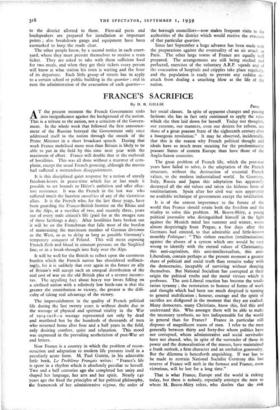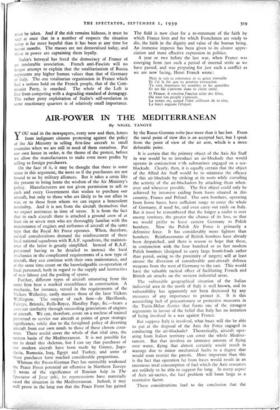FRANCE'S SACRIFICE
By D. R. GILLIE
AT the present moment the French Government sinks into insignificance against the background of the nation. This is a tribute to the nation, not a criticism of the Govern- ment. In the whole week that followed the first announce- ment of the Russian betrayal the Government only once addressed itself to the nation through the mouth of the Prime Minister in a short broadcast speech. During that week France mobilised more men than Britain is likely to be able to put in the field by this time next year with the maximum of effort. France will double that at the outbreak of hostilities. This was all done without a murmur of com- plaint, except the usual French grousing, although the masses had suffered a tremendous disappointment.
It is this disciplined quiet response by a nation of unruly freedom-lovers in peace-time which has at last made it possible to set bounds to Hitler's ambition and offer effec- tive resistance. It was the French in the last war who suffered much the heaviest casualties of any of the victorious allies. It is the French who, for the last three years, have been guarding the Franco-British frontier on the Rhine and in the Alps, at a sacrifice of two, and recently three, years out of every male citizen's life (paid for at the meagre rate of three farthings a day). After hostilities have broken out it will be on the Frenchman that falls most of the burden of maintaining the maximum number of German divisions in the West, so as to delay as long as possible Germany's temporary conquest of Poland. This will mean exposing French flesh and blood in constant pressure on the Siegfried line, or in a break-through into Italy over the Alps.
It will be well for the British to reflect upon the enormous burden which the French nation has shouldered unflinch- ingly, for it is unlikely that ever again in the future an ally of Britain's will accept such an unequal distribution of the real cost of war on the old British plea of a severer incomzt- tax. The appalling fact about heavy war losses falling on a civilised nation with a relatively low birth-rate is that the greater the contribution to victory, the greater is the diffi- culty of taking real advantage of the victory.
The impoverishment in the quality of French political life during the last twenty years is without doubt due to the wastage of physical and spiritual vitality in the War of 1914-1918—a wastage represented not only by dead and mutilated but by the hundreds of thousands of men who returned home after four and a half years in the field, only desiring comfort, quiet and relaxation. This mood was expressed in the prevailing aestheticism of post-War art and letters.
Now France is a country in which the problem of recon- struction and adaptation to modem life presents itself in a peculiarly acute form. M. Paul Guerin, in his admirable little book, Le Probleme Francais writes: " France's life is spent in a rhythm which is absolutely peculiar to herself. Two and a half centuries ago she completed her unity and shaped her language, her arts and her spirit. Nearly 140 years ago she fixed the principles of her political philosophy, the framework of her administrative regime, the order of Pans. her social classes. In spite of apparent changes and passing fashions she has in fact only continued to apply the rules which she then laid down for herself. Today our thoughts, our customs, our manners, even our desires for reform, are those of a great peasant State of the eighteenth century after a bourgeois revolution." It may be observed, incidentally, that this is the reason why French political thought and ideals have so much more meaning for the predominantly peasant States of eastern Europe than have those of the Anglo-Saxon countries.
The great problem of French life, which the post-war years have failed to solve, is the adaptation of the French structure, without the destruction of essential French values, to the modem industrialised world. In Germany, Italy, Russia and Japan this adaptation has apparently destroyed all the old values and taken the hideous form of totalitarianism. Spain after her civil war sees apparently no available technique of government except the totalitarian.
It is of the utmost importance to the future of the world that France should retain both the freedom and the vitality to solve this problem. M. Beuve-Mery, a young political journalist who distinguished himself in the fight against the Munich mind last summer and winter, wrote almost despairingly from Prague, a few days after the Germans had entered, to that admirable and little-known monthly Politique: " This violent reaction (totalitarianism) against the abuses of a system which one would be very wrong to identify with the eternal values of Christianity, this anti-capitalism, this anti-intellectualism, this anti- Liberalism, contain perhaps at the present moment a greater share of political and social truth than remains today with the democracies, incapable of surviving without denying themselves. But National Socialism has corrupted at their origin the political truths and the moral virtues which it professes. The anti-Liberal reaction has become the totali- tarian tyranny ; the restoration to honour of forms of work and thought which had been too much despised is turning to general stultification ; honour, courage and the spirit of sacrifice are disfigured in the moment that they are exalted. Many democrats, many Christians, know this, feel this and understand this. Who amongst them will be able to make the necessary synthesis, no less indispensable for the world in general than for France? France in particular still disposes of magnificent teams of men. I refer to the men generally between thirty and forty-five whom politics have not corrupted, whom administrative and social servitudes have not abased, who, in spite of the surrender of those in power and the demoralisation of the masses, have maintained a frank outlook, a firm character and an unshaken generosity. But the dilemma is henceforth anguishing. If war has to be made to restrain National Socialist Germany this last reserve of France will melt in the furnace and France, even victorious, will be lost for a long time."
That is what France, Europe and the world is risking today, but there is nobody, especially amongst the men to whom M. Beuve-Mery refers, who doubts that the risk must be taken. And if the risk remains hideous, it must be said at once that in a number of respects the situation today is far more hopeful than it has been at any time for recent months. The masses are not demoralised today, and those in power are captaining them loyally.
Stalin's betrayal has freed the democracy of France of an intolerable association. French anti-Fascists will no longer attempt to explain that the totalitarianism of Russia represents any higher human values than that of Germany or Italy. The one totalitarian organisation in France which had a serious hold on the French people, that of the Com- munist Party, is smashed. The whole of the Left is free from competing with a degrading standard of demagogy. The rather petty exploitation of Stalin's self-revelation in some reactionary quarters is of relatively small importance. The field is now clear for a re-statement of the faith by which France lives and for which Frenchmen are ready to die, the faith in the dignity and value of the human being. An immense impetus has been given to its dearer appre- ciation and more effective expression in politics.
A year or two before the last war, when France was emerging from just such a period of internal strife as we have passed, and was preparing for just such a conflict as we are now facing, Henri Franck wrote:
Mais je sais ta constance et ta grace eternelle Et j'ai la foi que to pourras ressusciter. Ta voix dominera les troubles et les querelles Et tes fits s'uniront dans ta claire unite.
0 France, il renaitra l'ancien éclat des fetes, Ou tout ton peuple s'unissait, Le temps oil, quand l'idee jaillissait de ta tete, La force auguste l'itayait.



































 Previous page
Previous page